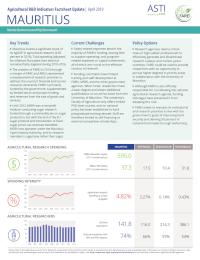Authors:
Nienke Beintema and Raj Ramnauth
Year:
2018
Publisher
International Food Policy Research Institute and Food and Agricultural Research and Extension Institute
Back to:
Key Trends
Mauritius invests a significant share of its AgGDP in agricultural research (4.82 percent in 2016). Total spending (adjusted for inflation) fluctuated over time but remained fairly stagnant during 2010–2016.
The creation of FAREI in 2014 through a merger of FARC and AREU represented a reassessment of research priorities to address the country’s financial and human resource constraints. FAREI is primarily funded by the government, supplemented by limited donor and project funding, and revenues from the sale of goods and services.
Until 2012, MSIRI was a nonprofit institute conducting sugar research funded through a commodity tax on sugar production, but with the end of the EU sugar protocol and introduction of fixed sugar prices, tax revenues dwindled. MSIRI now operates under the Mauritius Cane Industry Authority, and its research mandate is sugarcane rather than sugar.
Current Challenges
Salary-related expenses absorb the majority of FAREI’s funding, leaving little to support operating- and program- related expenses or capital investments, all of which are crucial to the effective conduct of research.
Funding constraints have limited training and staff development at FAREI, MSIRI, and the other government agencies. When hired, researchers have a basic degree and obtain additional qualifications on an ad hoc basis from the University of Mauritius. The university’s Faculty of Agriculture only offers limited PhD level courses, and no national policy has been established to fund postgraduate training abroad. Staff are therefore limited to self-financing or external competitive scholarships.
Policy Options
Research agencies need a critical mass of high-caliber professionals to effectively generate and disseminate research outputs and mentor junior scientists. FAREI could be used to provide researchers with an opportunity to pursue higher degrees in priority areas in collaboration with the University of Mauritius.
Although FAREI is also officially responsible for coordinating the national agricultural research agenda, funding shortages have prevented it from adopting this role.
FAREI needs to reassess its institutional and research priorities in line with the government’s goals of improving food security and deriving 50 percent of national food needs through biofarming.

